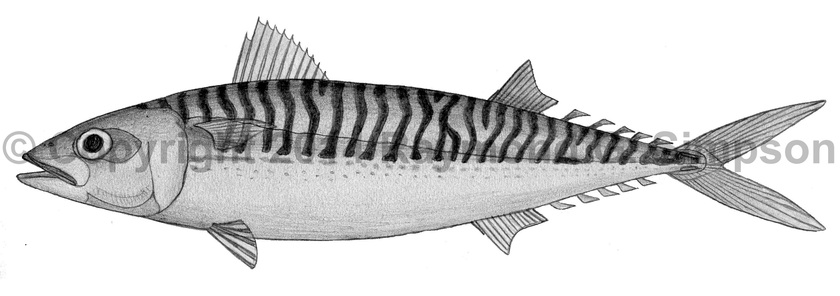
Common Name
Atlantic Mackerel
Year Described
Linnaeus, 1758
Identification
Dorsal Fin: XI-XIII, 9-15, followed by 5 finlets
Anal Fin: I, 11-12, followed by 5 finlets
Pectoral Fin: 20-22
Gill Rakers: 30-36 (first arch)
Vertebrae: 31 (13 precaudal)
Body fusiform, elongate, and rounded in cross-section. Snout slightly longer than eye diameter. Adipose eyelid present. Jaw extends to middle of orbit. A single interpelvic process. Dorsal fins well separated (gap about 1.5 times the length of the forst dorsal base). Spiny dorsal fin, second dorsal, and anal fin small with tall anterior lobes. Pectoral fin short. Caudal fin forked. Corselet not obvious; scales around pectoral fin larger in size. Body with small scales. Lateral line gently sloped. Two small caudal keels (no median keel). Swimbladder absent.
Color
Body bright silvery with a green to bluish sheen above. There are numerous oblique black bar markings above the lateral line. Markings rarely below lateral line. The upper fins are ducky to yellowish. The lower fins are pale.
Size
Maximum size to 60cm FL. Common from 30-40cm FL.
Habitat
Epipelagic in cold oceanic or shelf waters. Forms large schools.
Range
Northwestern Atlantic: Gulf of St. Lawrence, Canada to Cape Hatteras, NC.
References
Collette, B.B. and Nauen, C.E. 1983. Scombrids of the world. An annotated and illustrated catalogue of tunas, mackerels, bonitos and related species known to date. FAO species catalogue Vol. 2. , Source: FAO Fish. Synop. Vol. 125. 137pp.
Collette, B.B. 2002. Scombridae (pp 1836-1857). In: Carpenter. 2002. The living marine resources of the Western Central Atlantic. Vol. 3: Bony fishes part 2 (Opistognathidae to Molidae), sea turtles and sea mammals. FAO Species Identification Guides for Fisheries Purposes. American Society of Ichthyologists and Herpetologists Special Publication No. 5.
Whitehead, P.J.P. , M.-L. Bauchot, J.-C. Hureau, J.G. Nielsen and E. Tortonese. 1986. Fishes of the North-eastern Atlantic and the Mediterranean. Vol. I-III. UNESCO. Fishes of the North-eastern Atlantic and the Mediterranean. http://species-identification.org.